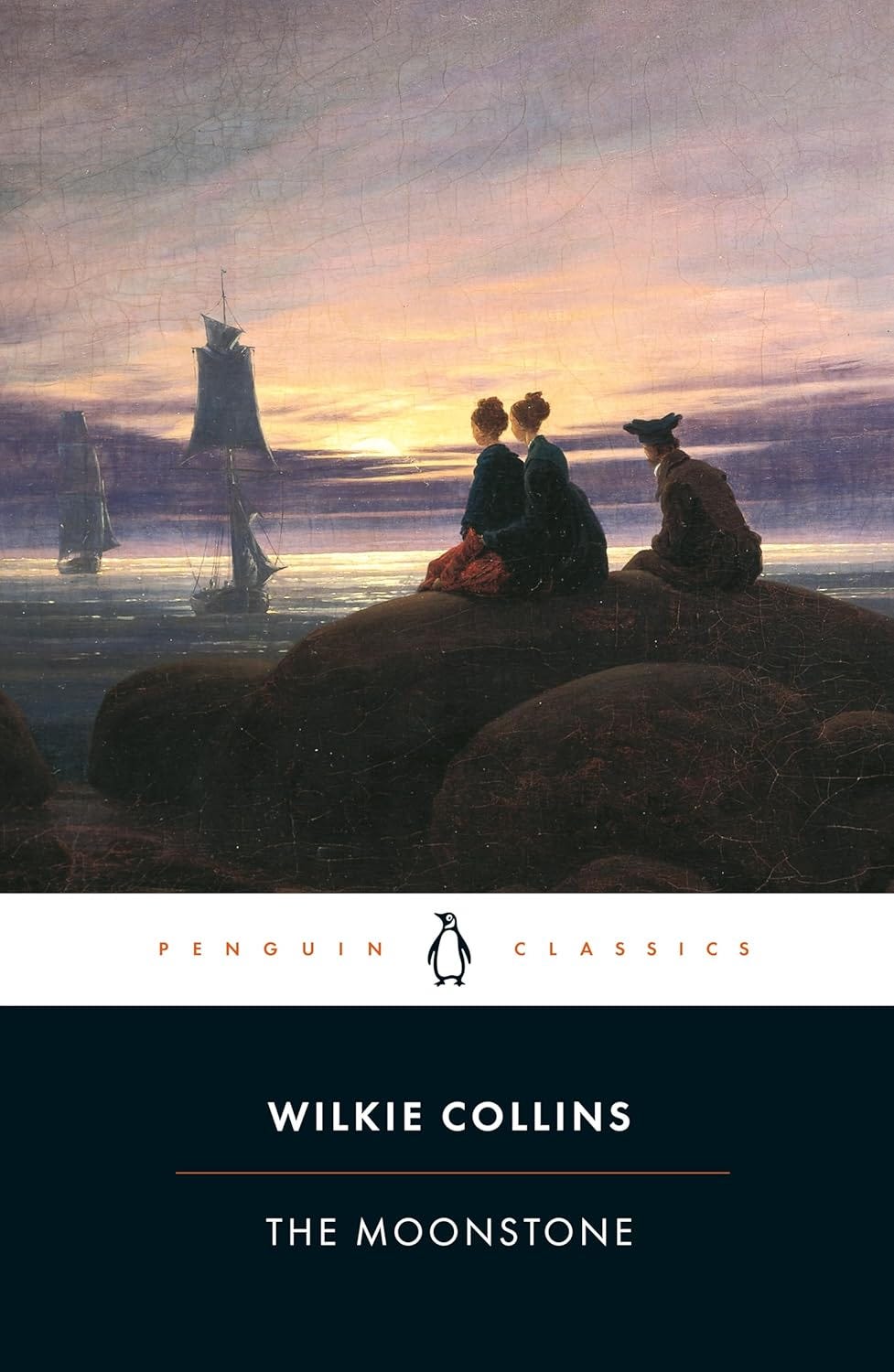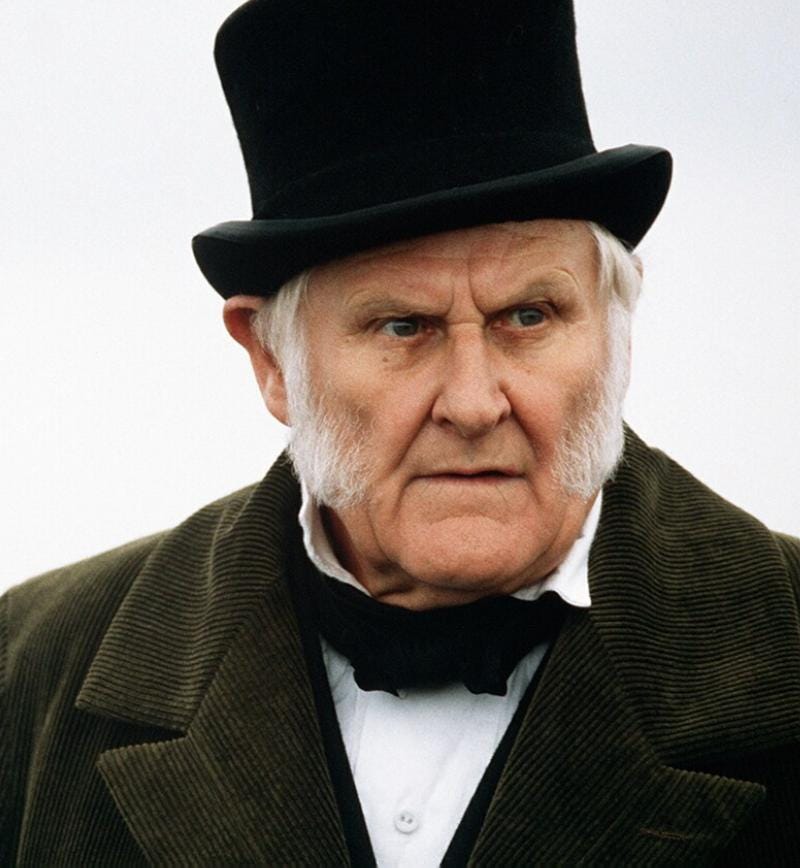Read-along – Robinson Crusoe (2 of 4)
The second quarter – and The Moonstone
Dear Castaways,
We’ve read the first half of Robinson Crusoe now – what are you thoughts? Here are my impressions:
Let me know what you thought in a comment!
A few people have mentioned the references to Robinson Crusoe in The Moonstone by Wilkie Collins. I love The Moonstone and it’s only now I’m reading Robinson Crusoe that I fully get the joke.
The Moonstone is a brilliant novel by Wilkie Collins, first serialised in 1868 in Charles Dickens’s magazine All the Year Round. The ‘Moonstone’ is a priceless yellow Indian diamond. Bequeathed to young Rachel Verinder, it disappears on the night of her eighteenth birthday party when a suspicious troupe of Indian jugglers has visited the house. Sergeant Cuff and Franklin Blake, a gentleman-adventurer, both attempt to unravel the drug-riddled mystery. Dorothy L. Sayers called it ‘probably the very finest detective story ever written’.
Much of the book is narrated by Gabriel Betteredge, the Verinder family’s faithful old steward. Gabriel is an appealing narrator – he is dutiful, loyal and kind. He is also conservative and slower-witted than the razor-sharp Sergeant Cuff.
Gabriel Betteredge’s personal philosophy is based on Robinson Crusoe. It is mentioned in the first sentence of the novel. He consults Robinson Crusoe like an almanac or a bibliomancy manual:
I have found it my friend in need in all the necessities of this mortal life. When my spirits are bad—Robinson Crusoe. When I want advice—Robinson Crusoe. In past times when my wife plagued me; in present times when I have had a drop too much—Robinson Crusoe. I have worn out six stout Robinson Crusoes with hard work in my service. On my lady’s last birthday she gave me a seventh. I took a drop too much on the strength of it; and Robinson Crusoe put me right again. (Chapter 1)
What I hadn’t realised is that Robinson Crusoe does exactly the same thing in Defoe’s novel – with his Bible. Several times he opens his Bible at random and finds salutary texts, for example:
only having open’d the Book casually, the first Words that occurr’d to me where these, Call on me in the Day of Trouble, and I will deliver, and thou shalt glorify me. (pp. 80-81)
it happen’d providentially the very Day that reading the Scripture, I came to these Words, He is exalted a Prince and a Saviour, to give Repentance, and to give Remission. (pp. 82)
One morning being very sad, I open’d the Bible upon these Words, I will never, never leave thee, nor forsake thee. (p. 97)
Collins’s joke is that Betteredge reads about Crusoe’s bibliomancy and is inspired to do the same, not with a Bible but with the novel in his hands.
As an experiment – if you have a copy of The Moonstone to hand – why don’t we take it one step further? We can take inspiration from Crusoe and Betteredge and try some bibliomancy using The Moonstone.
Take your copy of The Moonstone: think about a problem you wish to solve, riffle through the pages, stop at random, open the novel, slide your finger down the page, stop at random and read the wisdom of The Moonstone . . .
I tried this when I was wondering whether to stop work for lunch now or later and I got the following cryptic response:
It was done in a moment, in a noiseless, supple, cat-like way, which a little startled me, I own.
I had my lunch immediately, in as supple and cat-like a way as possible.
Let me know the Moonstone answers to your conundrums!
This week we’ll read the third quarter of Robinson Crusoe – up to page 194 in the Oxford edition: ‘. . . I hung my great Sword as usual, naked by my Side, and gave Friday his Hatchet.’ Enjoy! I look forward to discussing it with you on Friday 25th.
Here are links to our previous Robinson Crusoe posts:
The Schedule (9 June)
Daniel Defoe (23 June)
The Rise of the Novel by Ian Watt (4 July)
If you’re not reading Robinson Crusoe with us, remember you can choose to opt out of our conversation. Just follow this link to your settings and, under Notifications, slide the toggle next to ‘Robinson Crusoe’. A grey toggle means you will not receive emails relating to this title.







Before I read it, I expected 'Robinson Crusoe' to be more of a DIY manual than a religious treatise - but what do I know?
I wish I knew (or understood) more about geography and the sea. The storm sequence is scary - but probably even scarier if you have a better grasp of the mechanics of the sea. (I'd guess that people at that time would know much more than I do now.)
My other surprise is that Crusoe is just a killing machine. When he sees something, his first instinct is often to kill it. You can see the reason for it - food, protection - but he does seem to be rather enthusiastic about it.
What I'm enjoying is the sudden changes of tone - often along the lines 'you think things can't get worse - that's when they do'. Crusoe never quite managed to be a stoic (or Stoick). I also like the way he keeps using "I won't bother you with the details" - an easy get-out.
I'm finding the timeline tricky - we seem to jump ahead with little notice. We do get a sense of Crusoe changing but it doesn't feel - to me, at least - if we get a sense of him ageing. I'm still imagining him as a young man even though he must be heading for his late 30s.
The footprint is a real jolt - and just having the one is a great trick (otherwise we'd be thinking about where it comes from and where it leads). It's one of those twists that you wish you didn't know about in advance because you would have been spooked as much as Crusoe.
I'm enjoying the book too, highlighting his Reflections and enjoying both the everyday telling of the tasks he has to do, along with the exciting bits. I was particularly taken with his self-description of his outfit and how wild he must look.
For my Moonstone wisdom experiment, I wondered if I should plant more veggies in my garden this late in the season. In my ebook, I blindly scrolled The Moonstone, and admittedly it took me three tries to get any wisdom remotely applicable, but finally this came up, in Rosanna's confessional letter: "If I had only been a little less fond of you, I think I should have destroyed it. But oh! how could I destroy the only think I had which proved that I had saved you..." (I'm trying to keep any details out, to prevent spoilers!). I love growing veg very much...am very fond of them...and so this passage clearly is telling me that I must plant more. Kind of?